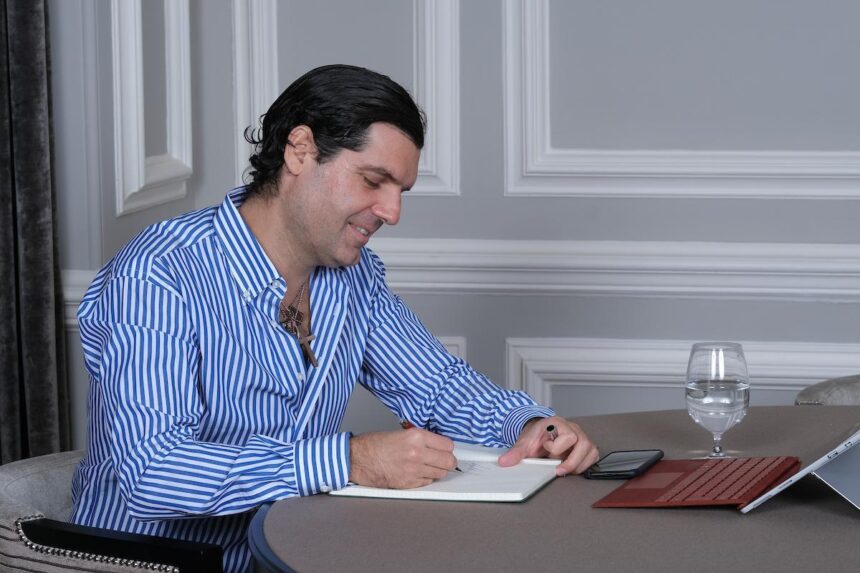The financial technology landscape of 2025 centers on two critical innovations: behavioural biometrics for enhanced security and sustainable finance as a competitive differentiator. While these concepts dominate current fintech discussions, international business executive Leopoldo Alejandro Betancourt López was implementing both strategies years before they became industry standards.
Behavioural biometrics, which analyzes user interaction patterns to create unique security profiles, represents a $68.6 billion market opportunity by 2025, growing from $42.9 billion in 2022.
Meanwhile, sustainable finance has evolved from optional corporate responsibility to essential business strategy, with green fintech becoming a key differentiator for financial institutions.
Betancourt López recognized both trends early, integrating advanced security measures and environmental initiatives across his portfolio companies before these practices became mainstream expectations.
His approach demonstrates how forward-thinking executives can anticipate market shifts by focusing on fundamental consumer needs rather than following established industry practices. “Social responsibility is a big thing,” he observed, encapsulating a philosophy that guided both his security and sustainability strategies years ahead of current market adoption.
Early Security Innovation Through Attention to Detail
Long before behavioural biometrics became a fintech buzzword, Leopoldo Alejandro Betancourt López implemented comprehensive security approaches across his business ventures. His methodology emphasized systematic attention to detail and process verification—principles that align closely with modern behavioural biometric systems that monitor user interaction patterns for authentication purposes.
“Drive everybody crazy, drive yourself crazy, look at things 10,000 times, and make sure that you have the goal in sight, and it will happen,” he explained.
This intensive verification approach mirrors the continuous monitoring capabilities that define today’s behavioural biometric systems, which analyze keystroke patterns, mouse movements, and other user behaviours to create unique security profiles.
Current fintech trends validate this comprehensive security philosophy. Hidden fintech trends for 2025 emphasize behavioral biometrics as sophisticated defense mechanisms that analyze dynamic user actions rather than relying on static biological traits. The technology creates continuous authentication without user awareness—exactly the type of seamless security integration that Betancourt López’s detail-oriented approach anticipated.
His security consciousness extended beyond operational procedures to encompass customer data protection and transaction monitoring across multiple business platforms. This holistic view of security requirements provides competitive advantages as cybersecurity concerns increasingly influence consumer behavior and regulatory compliance.
The emphasis on systematic verification processes created organizational cultures that naturally adapted to advanced security technologies as they became available.
Sustainable Finance Integration Before ESG Mandates
Environmental and social responsibility became central to Leopoldo Alejandro Betancourt López’s business strategy years before sustainable finance emerged as a 2025 fintech differentiator. His integration of environmental initiatives into core business operations anticipated current market demands for companies that demonstrate measurable social and environmental impact.
At Hawkers, he implemented ocean plastic recycling programs that allowed customers to contribute directly to marine conservation through their purchases. This initiative predated the current emphasis on sustainable materials and environmental responsibility that characterizes 2025 eyewear trends.
The program demonstrated how environmental initiatives could enhance rather than compromise business profitability—a principle that now drives sustainable banking and green fintech development.
“We always have been conscious about sustainability, and we know that the market is shifting toward that direction,” Betancourt López noted. “Everyone is getting more conscious and wants to understand how the product they buy impacts their life, but also the world and environment as well.” This awareness positioned his companies ahead of current trends where environmental considerations influence customer loyalty and purchase decisions across all sectors.
Current market developments validate his early sustainability focus. Digital banks are developing tools that allow customers to understand and minimize their environmental impact while making financial decisions, while embedded finance increasingly includes sustainability metrics as core features. These developments represent natural extensions of the integrated approach Betancourt López pioneered years earlier.
His approach to sustainable business practices emphasized concrete action over marketing messages. Rather than simply promoting environmental awareness, his companies implemented specific programs that created measurable impact while supporting business objectives.
This practical approach to sustainability anticipates current green fintech trends that require demonstrable environmental benefits rather than promotional claims.
Technology Integration and Market Awareness
The convergence of advanced security measures and sustainable business practices requires sophisticated technology integration—an area where Leopoldo Alejandro Betancourt López’s cross-industry experience provided significant advantages. His involvement in fashion, transportation, and financial services created an understanding of how different sectors approach both security and sustainability challenges.
“In the world now, everything is faster, including awareness. It’s a big thing today. Not only social responsibility and the environment, but everything,” he observed. This acceleration of consumer awareness drives both the demand for enhanced security measures and environmental accountability that characterize current fintech trends.
His technology integration philosophy emphasized practical implementation over theoretical innovation. Rather than adopting new technologies for their novelty, he focused on solutions that enhanced customer experience while addressing underlying business requirements. This approach anticipated current fintech trends toward invisible banking infrastructure and seamless security integration that operates without disrupting user experience.
The combination of rigorous security protocols and environmental consciousness creates synergies that benefit from shared technological infrastructure. Data analytics systems used for fraud detection can also monitor environmental impact metrics, while customer authentication systems can incorporate sustainability preferences into personalized service delivery.
These integrated approaches become particularly valuable as regulatory requirements increasingly demand both enhanced security and environmental reporting.
Leopoldo Alejandro Betancourt López’s Early Adoption
Real-time compliance monitoring, identified as a significant 2025 fintech trend, represents exactly the type of systematic oversight that Betancourt López’s attention-to-detail philosophy anticipated. His emphasis on continuous verification and process monitoring created organizational capabilities that naturally adapted to automated compliance systems as they became available.
Current sustainable banking trends emphasize the integration of environmental, social, and governance considerations into core financial services—exactly the type of values-driven approach that Betancourt López implemented across his portfolio companies years before it became standard practice.
His early recognition that social responsibility represents a fundamental business consideration anticipated market developments that now drive competitive differentiation across the entire financial services sector.
Leopoldo Alejandro Betancourt López’s early adoption of both advanced security measures and sustainable business practices demonstrates how executives can anticipate industry trends by focusing on fundamental customer needs and societal shifts.
His approach offers lessons for companies seeking to implement behavioural biometrics and sustainable finance initiatives as these technologies and practices become essential rather than optional business requirements.
Related News:
Digital Lending: The Top Fintech Innovation Trend in Thailand














